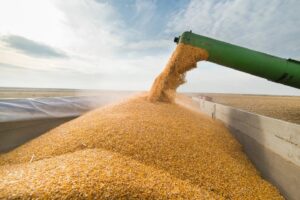
The Hungarian Agriculture Ministry on 19 April expanded the list of Ukrainian agricultural products banned for import to 25.
According to Hungarian Agriculture Minister Istvan Nagy, quoted by the Hirado.hu daily, the measures were introduced for an interim period and will allow for meaningful and long-term EU measures, a review of the full duty-free nature of Ukrainian goods and the work of solidarity corridors.
Nagy explained that the ban applies to cereals, rapeseed and sunflower seeds, flour, vegetable oil, honey and some types of meat, and is valid until June 30, 2023.
At the same time Hungary does not prohibit the transit of these products through its territory.
Transit traffic is still allowed in Hungary, but the competent authorities will seal the shipments at the border and then monitor them with electronic devices and patrols. Transit procedures for affected products will be checked throughout the country.
The minister added that carriers who violate the rules could be fined. The fine can reach the full value of the cargo.
As a reminder, Bulgaria imposed a temporary ban on food imports from Ukraine, with the exception of transit goods.
In recent days, Poland, Hungary and Slovakia banned import of Ukrainian agricultural products, in Romania there are calls for this due to the harm to local farmers due to lower prices of Ukrainian products.
Poland on the night of April 20 to 21 resumes transit of Ukrainian agricultural products under new rules.

U.S. Secretary of State Antony Blinken has announced sanctions against oligarch and former Ukrainian official Ihor Kolomoisky due to his involvement in major corruption.
“This designation is made under Section 7031(c) of the Department of State, Foreign Operations, and Related Programs Appropriations Act, 2020. In addition to Ihor Kolomoisky, I am publicly designating the following members of Ihor Kolomoisky’s immediate family: his wife, Iryna Kolomoiska, his daughter, Andzelika Kolomoiska, and his son, Israel Zvi Kolomoisky. This action renders Ihor Kolomoisky and each of these members of his immediate family ineligible for entry into the United States,” Blinken said in a statement released by on the website of the U.S. Department of State on Friday.
Blinken said that in his official status as the head of Dnipropetrovsk region of Ukraine from 2014 to 2015, Kolomoisky was involved in corrupt acts that undermined rule of law and the Ukrainian public’s faith in their government’s democratic institutions and public processes, including using his political influence and official power for his personal benefit.
“While this designation is based on acts during his time in office, I also want to express concern about Kolomoisky’s current and ongoing efforts to undermine Ukraine’s democratic processes and institutions, which pose a serious threat to its future,” the secretary of state said.
“This designation reaffirms the U.S. commitment to supporting political, economic, and justice sector reforms that are key to Ukraine’s Euro-Atlantic path. The United States continues to stand with all Ukrainians whose work drives reforms forward. The Department will continue to use authorities like this to promote accountability for corrupt actors in this region and globally,” Blinken said.
Aforementioned Section 7031 of the Department of state, Foreign Operations and Related Programs Appropriations Act gives the Secretary of State the power to deny entry to the United States of foreign government officials and their immediate family members, in respect of whom there is reliable information that they are involved in significant corruption (including related to the extraction of natural resources) or in gross violation of human rights.
An exception may be entry into the United States if it will contribute to the achievement of important goals of the U.S. law enforcement agencies or occurs within the UN Headquarters Agreement.